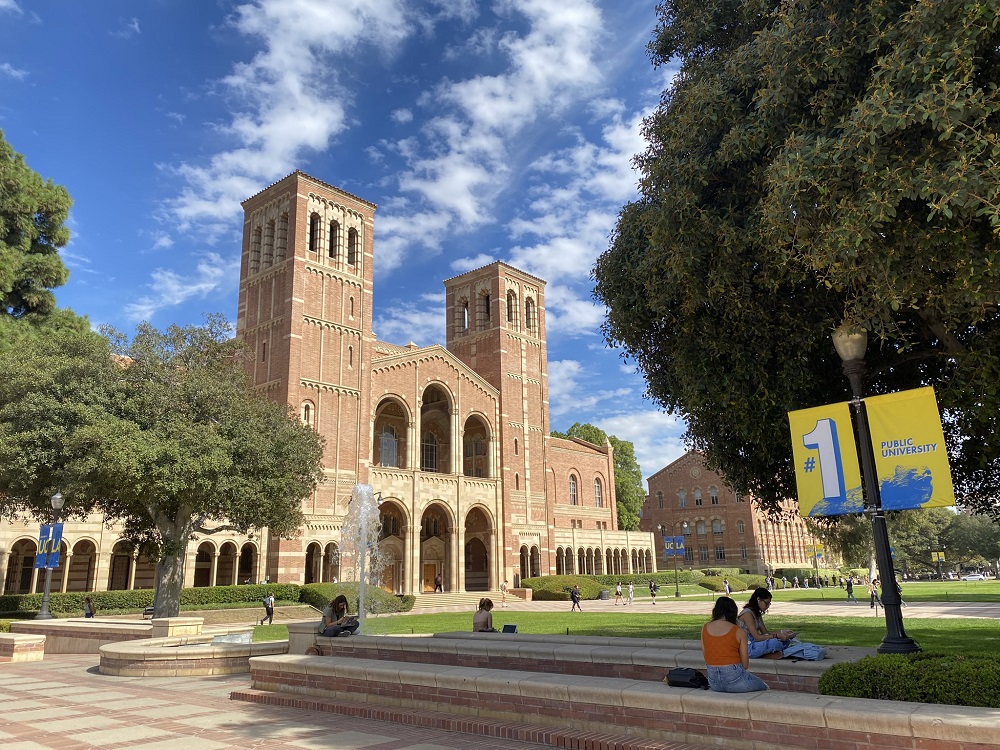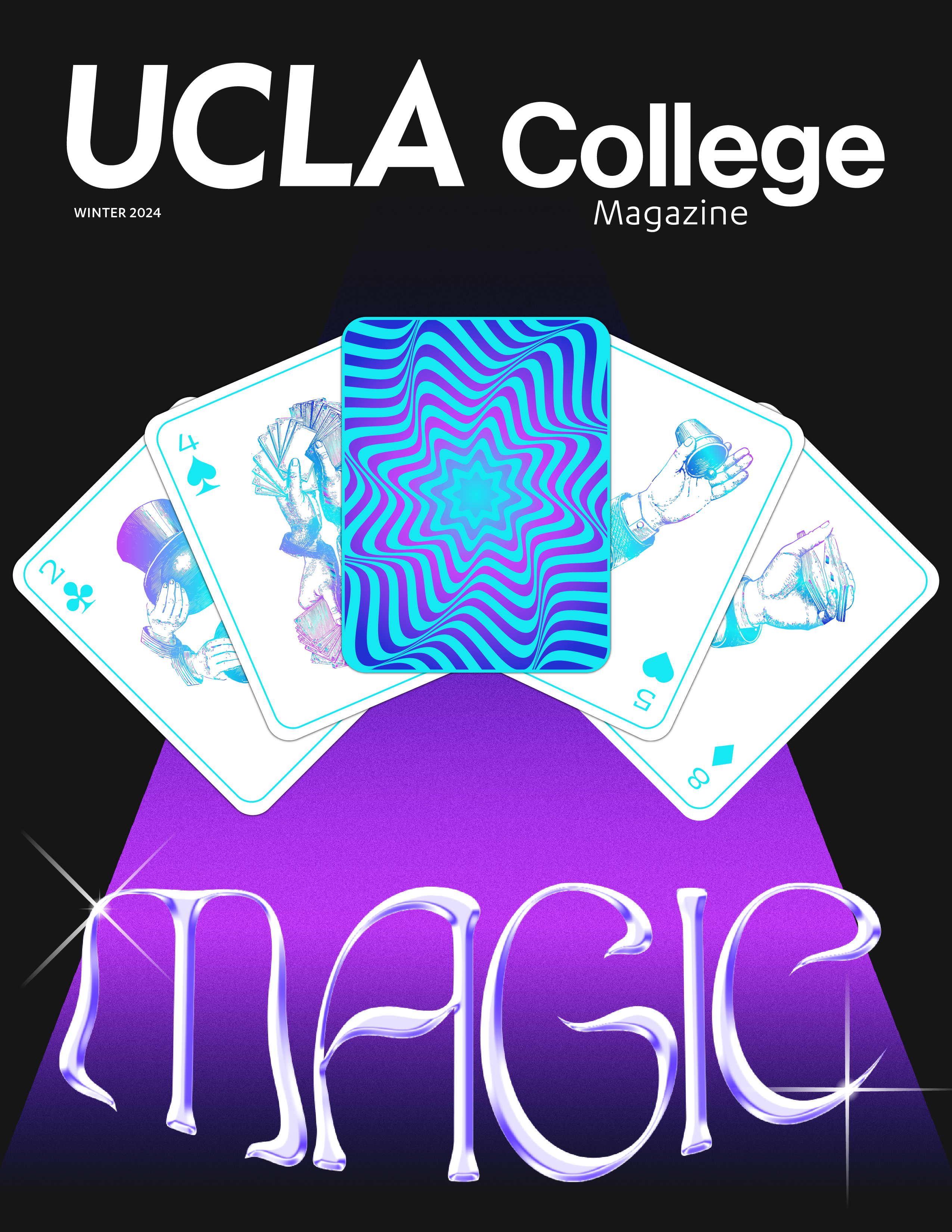COLLEGE VOICES
Giving Legacies
Stories of generosity from donors across the UCLA College community
By Emma Horio | December 11, 2024
A LINGUISTICS LEGACY
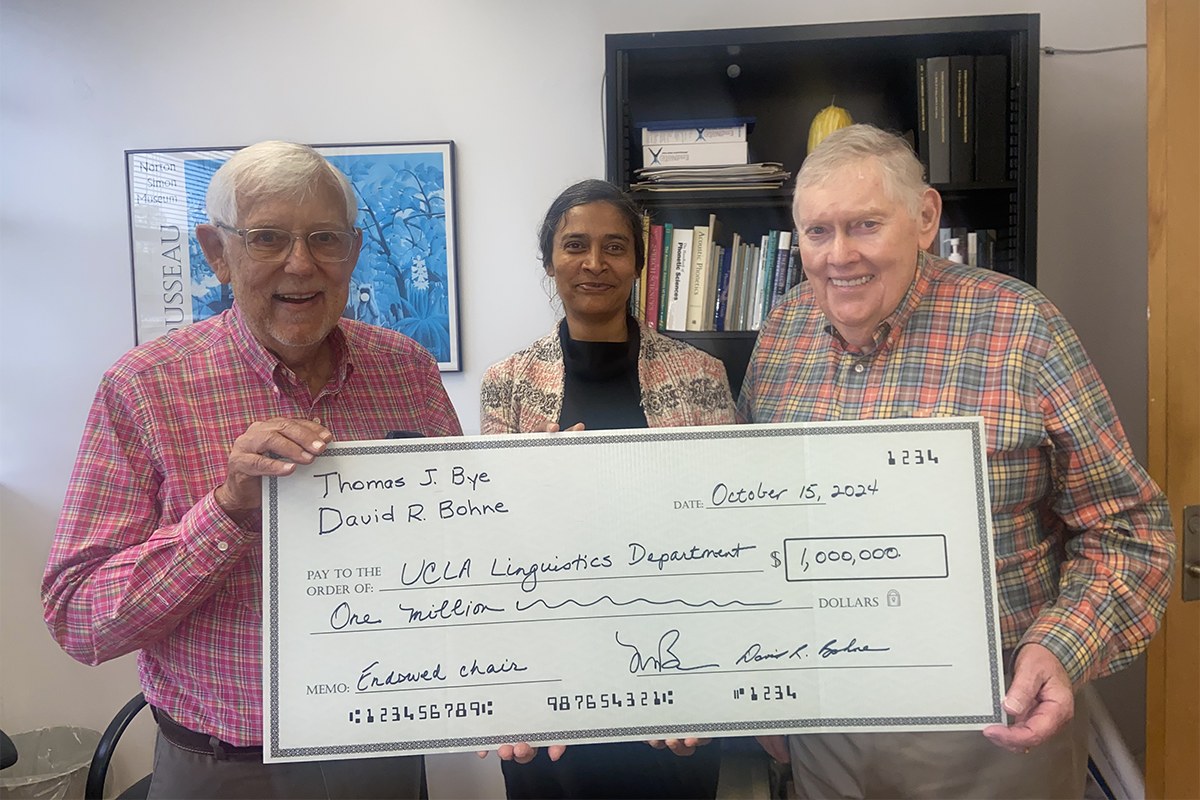
Tom Bye M.A. ’72, Ph.D. ’76; Megha Sundara, chair of the UCLA Department of Linguistics; and David Bohne
UCLA College/Emma Horio
Husbands Tom Bye and David Bohne have been saving and investing their money since the very beginning of their relationship 59 years ago — always with the intention of giving it all away at the end of their lives.
Somewhere along the way, posthumous plans became present ones. The couple wanted to see the results of their philanthropy in their lifetimes, and together, they have made substantial donations to UCLA, the Bay Area Cancer Support Community, the University of Utah and the Lafayette Library Foundation.
“We thought, let’s do it now, because we don’t need the money,” Bohne says. “Otherwise, we’d never see any results, never really know if things happened the way they were supposed to. It makes me happy to be able to share those resources with other people.”
With the couple’s $2 million pledge to the UCLA Division of Humanities, augmented by $500,000 in matching funds, UCLA established the Thomas J. Bye Linguistics Laboratory Program. The program supports interdisciplinary research with a focus on child language acquisition, which Bye studied during his time as a Ph.D. student in UCLA’s linguistics program.
Their generosity shows no sign of slowing: They’ve just given $1.5 million to establish the Thomas J. Bye and David Bohne Endowed Term Chair in Linguistics. The chair will enable its holder to provide a bridge between theory and practice, Bye says — relating linguistics research questions with the interests and concerns of the general population.
“When I reflect back on my career, my greatest joy was seeing change and promoting change,” Bye says. “I derive the same joy from seeing improvement in and strengthening UCLA’s linguistics program. The department has an extraordinary reputation; it’s a matter of pride that we are able to support and enhance that reputation.”
“It’s very satisfying to us to see the fruits of our labor being used, and knowing it will extend far beyond our lifetime,” Bohne says.
A HOME FOR HELLENIC CULTURE
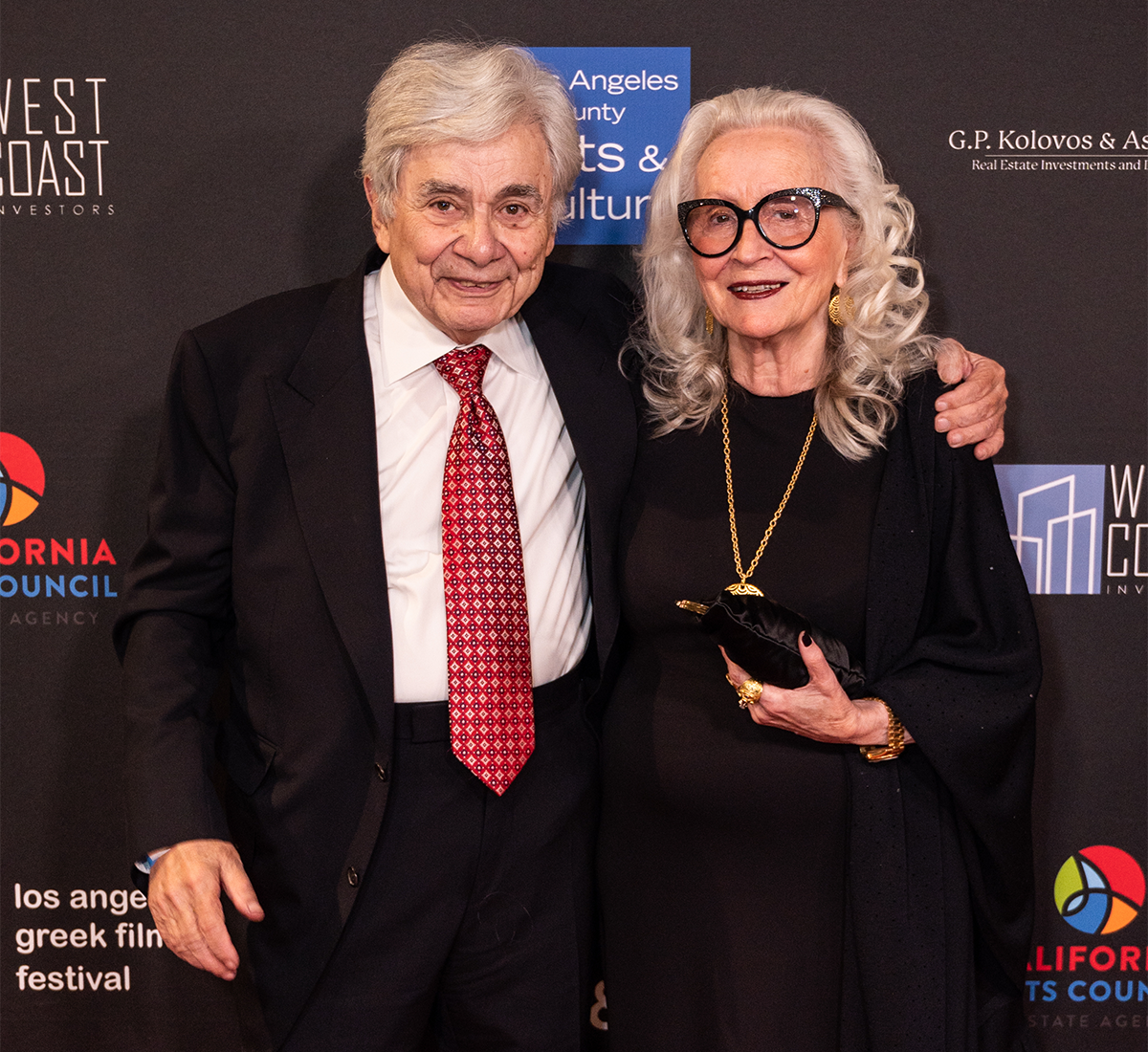
George M.S. ’66 and Tina Kolovos
Srini Natarajan/Urbanite|LA
When George Kolovos came to the United States from Greece, he had $20 and an endless reserve of work ethic. He graduated from UCLA in 1966 with a master’s degree in engineering. Nearly 60 years later, after successful careers in both engineering and real estate, he is working toward a new goal with his wife, Tina Kolovos: supporting endeavors that highlight the beauty of Hellenic culture.
“As a philanthropist, I wanted to support institutions involved in Greek culture and also individuals who had potential,” he says. “UCLA is a great school for education, for research and for service. Those are things that I really love.”
In 2019, the couple made a gift to establish the George P. Kolovos Family Centennial Term Chair in Hellenic Studies at UCLA to honor their children and grandchildren, as well as to commemorate the memory of George Kolovos’ parents, Panayotis and Maria. The chair supports a distinguished scholar in the UCLA Stavros Niarchos Foundation (SNF) Center for the Study of Hellenic Culture.
“Holding the George P. Kolovos Family Centennial Term Chair in Hellenic Studies has made a tremendous impact on my ability to support Center initiatives in Los Angeles and Greece and, as a professor, to conduct public impact research in Greece,” says Sharon Gerstel, the Center’s founding director and a professor of Byzantine art and archaeology and inaugural holder of the Kolovos Chair.
Recently, the Kolovos Chair helped support a large-scale project on traditional weaving in Geraki, Laconia, a village close to the one where George Kolovos was born. Involving graduate students from UCLA, the project encompassed research in the village and led to the publication of a 288-page catalog in English and Greek editions, a website devoted to the art of weaving in Geraki, digital mapping of the village, a photo exhibition and other endeavors.
George and Tina Kolovos are also steadfast patrons of the arts in Los Angeles, particularly as it relates to Hellenic culture, as well as of archaeological and artistic endeavors in Greece. The couple has supported the Los Angeles Greek Film Festival since its inception 17 years ago. In Greece, they have contributed funds to the Archaeological Museum of Nemea and the Society for the Revival of the Nemea Games, both located in Tina’s village.
“I am an American, but I love the country of my birth,” George Kolovos says. “Because of that, and because I miss my country, I support the UCLA SNF Center for the Study of Hellenic Culture.”
HELPING HANDS AND HEARTS
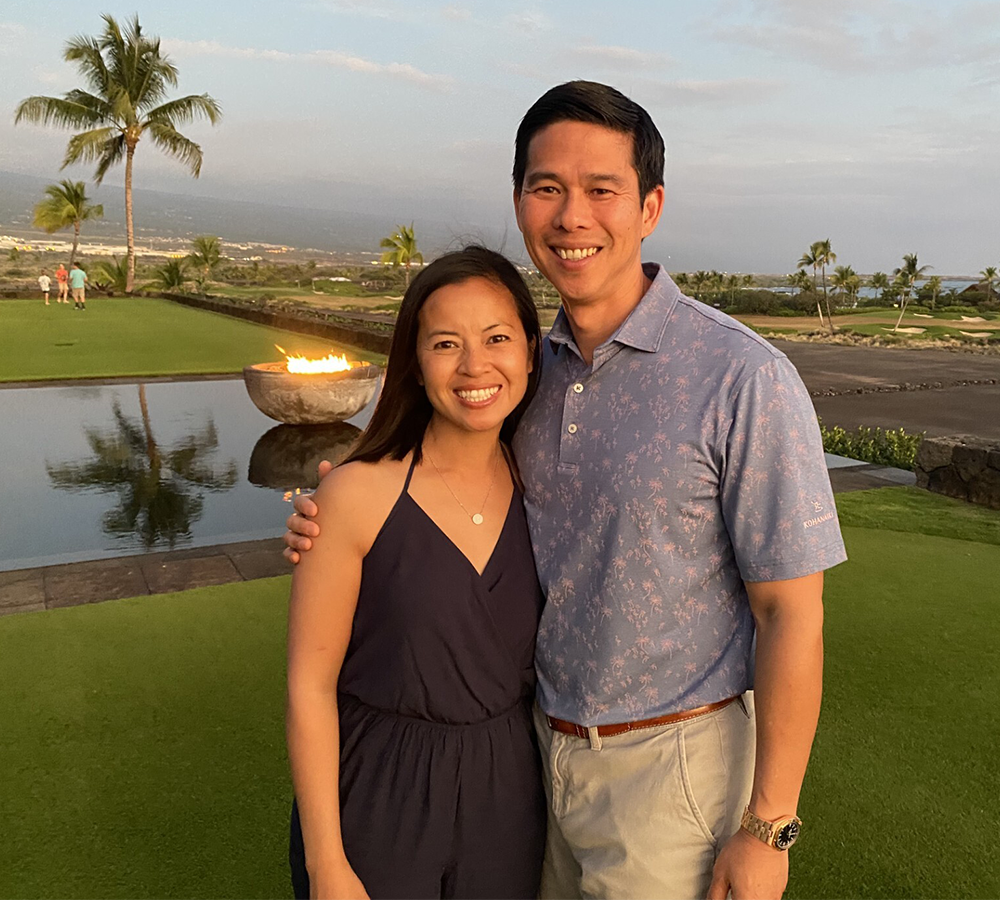
Pauline Le M.P.H. ’00 and Kiet Lam ’98, M.P.H. ’00
Courtesy of Kiet Lam and Pauline Le
Kiet Lam ’98, M.P.H. ’00 and Pauline Le M.P.H. ’00 have fond memories of UCLA from late-night study sessions with other members of their master of public health degree cohort — people whom they still call close friends. In addition to forging lifelong social bonds, the couple learned to consider how socioeconomic inequalities affect health outcomes, igniting a passion for social justice work that has led them to become champions of UCLA’s Academic Advancement Program, which supports students from historically underrepresented backgrounds.
“At UCLA, one of the first things I learned is that your health outcome is so related to your ZIP code,” Le says. “You think it’s genetics, and you think this and that. But when you realize that access and opportunity really impact how people eat, how people think, whether they’re likely to be in a more oppressed community, you realize this is just luck — the ZIP codes that we were born into.”
Lam and Le had been supporting various areas of UCLA since 2002, but during the George Floyd protests of 2020, they realized they wanted to be more involved in creating positive social change.
“It was a wake-up call,” Lam says. “It made us realize that we didn’t get to where we are now by ourselves. We wouldn’t have this success without the other people, programs and systems that supported us along the way.”
Lam recalls the transformative support he received from AAP during his undergraduate years at UCLA as a first-generation student who emigrated from Vietnam. Adjusting to a big campus and to college itself, he says, felt impossible — but he succeeded with the guidance and programs AAP provided.
In 2021, Lam worked with the UCLA Alumni Association and AAP volunteers to launch the AAP Alumni Network, of which he currently serves as the inaugural president in addition to serving on the AAP advisory council. The network connects recent AAP graduates with professional development and mentorship opportunities, and it offers experienced AAP alumni opportunities to give back through philanthropic support.
In 2023, the couple made a gift to establish the Pauline Le and Kiet Lam AAP Greatest Needs Endowment, AAP’s first-ever endowed fund to provide broad support for students. Their firsthand volunteer experience — at UCLA and with a plethora of other organizations — led them to create a discretionary fund so that those doing the work could put the money where it was needed most.
“Board work, high-level strategy work is important,” Le says. “But I also have a strong conviction that if you haven’t done the day-to-day work, you’re not going to be able to execute on the strategy. You can have a beautiful vision, but if you don’t understand the nuances and the everyday challenges, it’s not going to be an executable strategy.”
To better understand how they can help at the everyday level, Lam and Le both engage in hands-on volunteering on a regular basis. They have been honored for their dedication to the San Francisco-Marin Food Bank, and Le volunteers for several causes, including the San Francisco Court Appointed Special Advocate Program and various municipal animal shelters.
In addition to his role as president of the alumni network, Lam mentors AAP alumni, providing career and mentoring support to AAP grads who are interested in advancing their careers. He received the 2023 UCLA Award for Volunteer of the Year for his service to AAP.
“Getting in, rolling up our sleeves and doing the frontline work really gives us a good perspective on how hard it is to do what [those running AAP] do,” Lam says. “But to feel that deeper connection, you need to be in it day after day.”
PASSION FOR PLANTS — AND PRIZES
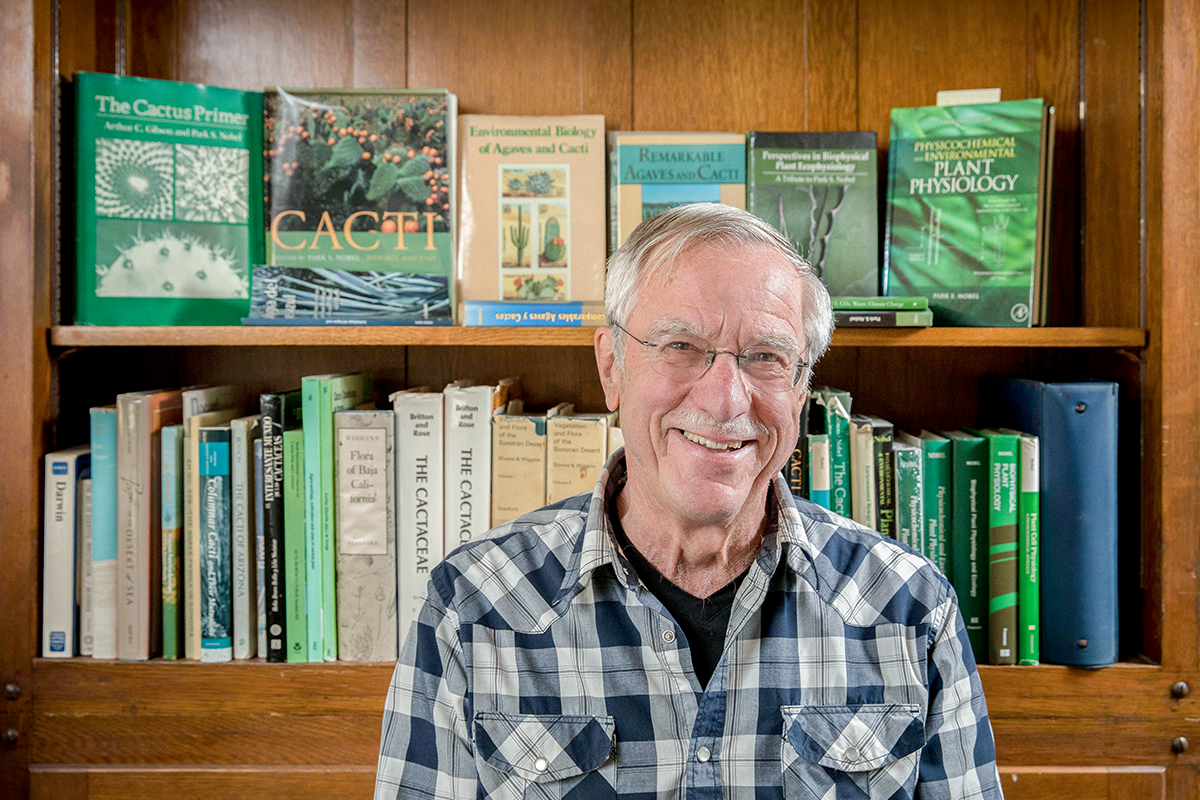
Park Nobel
UCLA College/Alyssa Bierce
It’s one thing to love agaves and cacti enough to plant 4,000 of them in one’s yard. It’s another to spend one’s life making the study of these prickly plants accessible to undergraduate students. UCLA distinguished professor emeritus Park Nobel has done both.
Nobel planted the garden in his yard when he moved into his current home. Thirty years later, it is still blossoming, thanks to his diligent care and the sparse Los Angeles rainfall, which is all the resilient plants need. He has nurtured many young scientific careers with the same diligence, having taught at UCLA for 40 years and created several undergraduate scholarships.
One of Nobel’s great contributions to the study of plants that can survive with little water and don’t move in the wind is a series of books on plant physiology spanning 50 years. The fifth edition, titled “Physicochemical and Environmental Plant Physiology,” was published in 2020. The series began at UCLA in 1967 as a way to get through to undergraduate students, who often came to Nobel’s classes with knowledge gaps, he recalls.
“Physics, calculus, engineering: These aren’t taught well in high school, so I had to write with an eye toward simplicity,” says Nobel, who developed his work in a way that would aid students who may not have received the necessary preparation for the rigor of their studies at UCLA. (In addition to the series, Nobel’s staggering research output totals nearly 400 papers and 18 books he has either written or edited over the course of his career.)
Nobel nurtures undergraduates studying plant sciences by funding scholarships and awards to aid in their studies. At UCLA, he has made gifts to establish the Park S. Nobel Plant Biology Undergraduate Scholarship Endowment and the Park S. Nobel Prize for Excellence in Plant Science, which exist to support undergraduate students in the ecology and evolutionary biology department. Nobel’s philanthropy also supports the botanical garden at UCLA — Park’s Patio, located in the UCLA Mathias Botanical Garden, bears his name in recognition of his generosity.
“The university chooses the best people, and if they need money, I try to help them,” Nobel says. By his count, he has given more than $1 million to undergraduate scholarships at UCLA, UC Berkeley and Cornell.
“I do it for undergraduates because they’re the future of this country,” Nobel says. “Really, they’re the future of the world.”
FRUITS OF SOCIAL RESPONSIBILITY
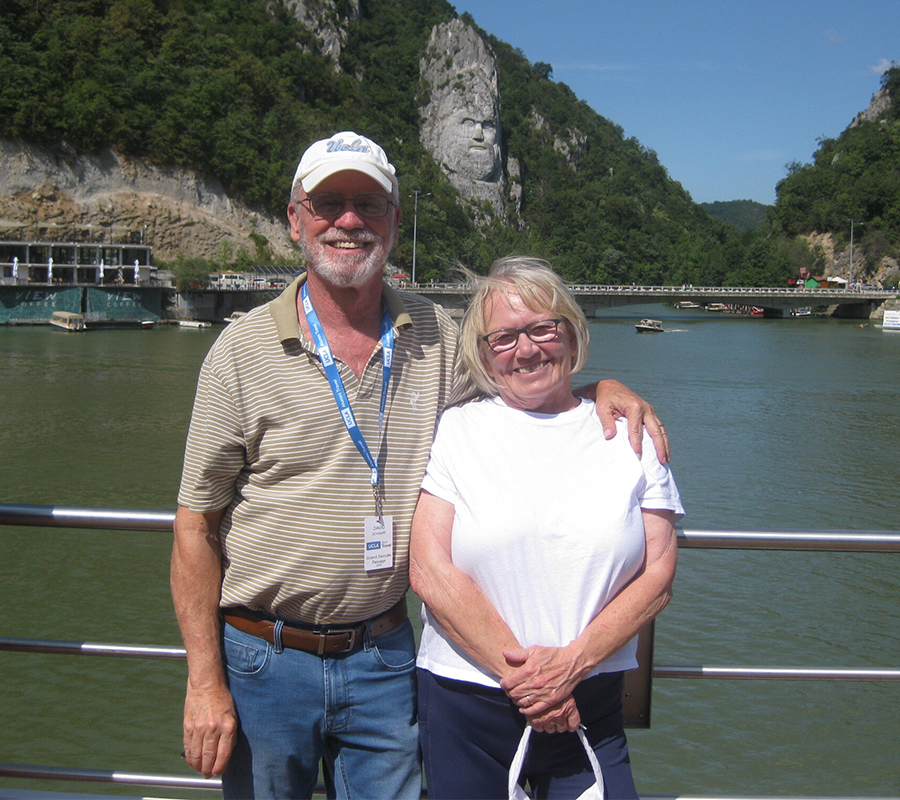
David Schnapp ’71 and Karin Cooper
Courtesy of David Schnapp and Karin Cooper
Although the Vietnam War cast a pall over his time as a student, David Schnapp ’71 still remembers his UCLA years with fondness. The Bruin basketball team, with the help of legends Kareem Abdul-Jabbar and Bill Walton, won the NCAA championship every year Schnapp attended.
“As a student, you could camp out one night outside Pauley and get season tickets for every game for $3.75,” Schnapp recalls.
He’s still a fan of UCLA sports, but his focus has shifted to supporting UCLA more generally.
“I’m amazed by the breadth of expertise in every conceivable field of study — including medicine, which I’ve benefited from,” Schnapp says. “It’s just overall excellence all around. I watch UCLA games and support them, but I really want to support the university itself as an engine of economic and academic excellence.”
Schnapp volunteered with the UCLA South Bay Chancellor’s Society regional volunteer committee for over a dozen years, at one point serving as its chair. Now, because of organizational changes, he serves as a Chancellor’s Society Ambassador and is a proud annual donor at the Chancellor’s Cabinet level.
This March, Schnapp, an alumnus of UCLA’s political science program, made a gift to establish the David M. Schnapp Endowed Scholarship for Social Sciences. It’s the first endowed undergraduate scholarship in the UCLA Division of Social Sciences and will be awarded to incoming first-year and transfer students.
“I think the four years I spent at UCLA kind of formed the basis for everything I did after, and I just wanted to help some other youngsters have the same opportunity and hopefully have the same future,” Schnapp says. “It’s nothing more complicated than that.”
In addition to bequests totaling around $3 million, David and his wife, Karin Cooper, will be leaving UCLA arguably the greatest gift a person can give: they are a part of the university’s Donated Body Program, which supports research endeavors in the David Geffen School of Medicine at UCLA.
“It’s a way that you can give back some of what UCLA’s given you,” Karin says, and the pair smile at one another.
CHARTING HIS OWN COURSE
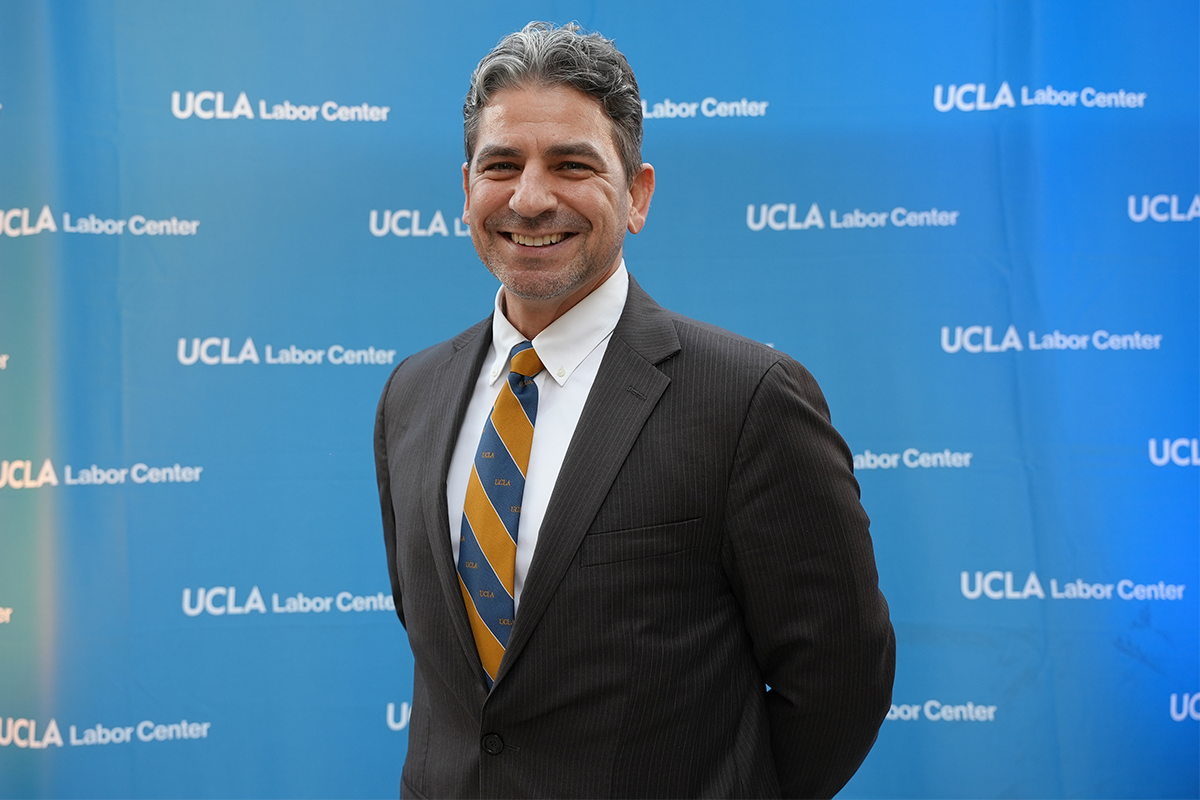
Nathan Seidman ’96
Jaime Ballesteros/Blue Veil Films
Nathan Seidman ’96 came to UCLA to study economics and quickly discovered that his passion was for studying the workplace and workers’ rights, rather than numbers. He’s now a staunch long-term supporter of UCLA’s Labor Center — during his time as a student, it helped him chart a course to a long and fruitful career that aligned with his interests.
In those years, the Labor Center had not yet had its growth spurt, and there was no labor studies major or formal program to speak of (these would come later, in 2019). But in the heart of Southern California, Los Angeles was growing into a vibrant community for workers to organize. The labor rights campaign Justice for Janitors gained traction in 1990, as the city’s janitors fought en masse for better working conditions, and went on to involve more than 225,000 janitors across the U.S. and Canada.
Seidman recalls witnessing early union activity on campus, including a gathering hosted by UCLA involving representatives from the American Federation of Labor and Congress of Industrial Organizations, or AFL-CIO, a national trade union center. Fascinated, Seidman chose a specialization in organizational studies — UCLA’s version of a minor at the time — where he found an introduction to studying trade unions and professional associations.
His studies soon led Seidman to seek out internship opportunities in labor and employment relations, which brought him to UCLA’s Labor Center. In the ’90s, the center housed a folder of faxes from local unions searching for interns and not much else.
“The Labor Center, if I recall correctly, was just an inconspicuous office in a building somewhere in Westwood Village,” he says. “At that time, it was not much more than an entrance.”
For Seidman, it proved to be the entrance to a fulfilling career. After interning with a local hotel workers’ union and with the Los Angeles Mayor’s Office of Economic Development, he began working with the federal government as an investigator in the Department of Labor. Now serving as the assistant to the regional director for the National Labor Relations Board, Seidman has not forgotten his beginnings: he has consistently given to the UCLA Labor Center for nearly 20 years.
“The Labor Center is very positive and forward-thinking and forward-looking,” he says. “It is tremendous to watch the good people there continue to do their good work in researching and assisting with the workplace in Southern California.”
Another way Seidman gives back to his alma mater is by volunteering as a mentor with UCLA’s Alumni Mentorship Program. He meets with undergraduate and graduate students to talk about their interests, give them ideas and be the support that many students don’t get elsewhere. As one who charted his own course in a still-burgeoning field, Seidman’s goal is to help students consider all of the options open to them so that they can map their paths, too.
He encourages other alumni to consider the fulfilling nature of giving back to UCLA.
“If there’s an organization at UCLA that played a part in their career goals, I would encourage alums to say thank you however they can,” Seidman says. “It’s a great way to remember the helping role UCLA played in allowing us alums get to where we want to be in our lives.”
MOVING SCIENCE FORWARD FOR ALL
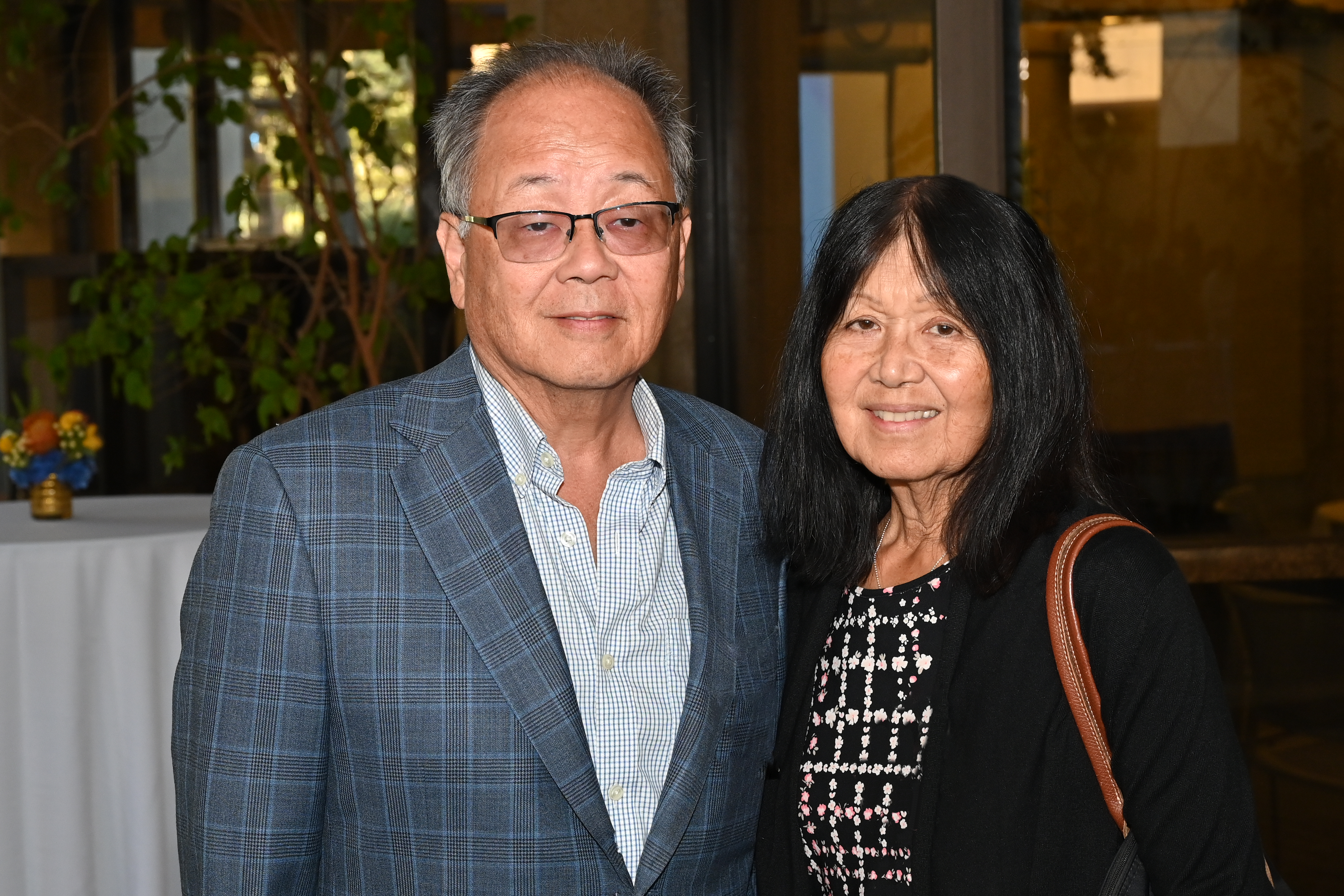
Keith ’77, M.D. ’83 and Cecilia Terasaki
UCLA/Todd Cheney
Few families can claim the incredible Bruin impact of the Terasakis. The collective ripple effect the family has made possible is on display in countless ways, from the Terasaki Life Sciences Building to innumerable lives touched and changed through science, research and teaching.
Son of Paul and Hisako Terasaki, Keith Terasaki is a double Bruin with a B.A. in math/applied science and an M.D. from the David Geffen School of Medicine at UCLA. In addition to serving as chairman of the Terasaki Family Foundation, he is the chairman of the board of directors of the Wesley Health Clinics, the main provider of health care on Skid Row in downtown Los Angeles.
Growing up in San Francisco with three siblings, Cecilia Terasaki attended UC Berkeley and worked in the computer field after college, including as a systems analyst. She turned her focus to the care of the couple’s children, Paul and Susie, and has long contributed to a variety of volunteering efforts as well as being a board member of the Terasaki Family Foundation and The Terasaki Institute for Biomedical Innovation. She is a proud member of Women in Philanthropy at UCLA.
Over the years, the couple has supported multiple areas on campus, including establishing the Keith and Cecilia Terasaki Presidential Endowed Chair in the Division of Life Sciences, and are well known for attending Bruin events and showing support for UCLA in multiple ways.
Dedicated to science in all its forms, they went on in 2020 to establish UCLA’s Keith and Cecilia Terasaki Endowed Chair in Physical Sciences. Its inaugural holder is Alvine Kamaha, one of the world’s leaders in the search to detect dark matter and winner of the 2024 Edward A. Bouchet Award from the American Physical Society.
“We know firsthand how incredible our UCLA scientific community is — the work they are doing here and around the world is moving all fields forward,” Keith and Cecilia Terasaki said. “We’re honored to be able to help Bruin scientists past, present and future continue to raise the bar on this incredible living legacy.”


